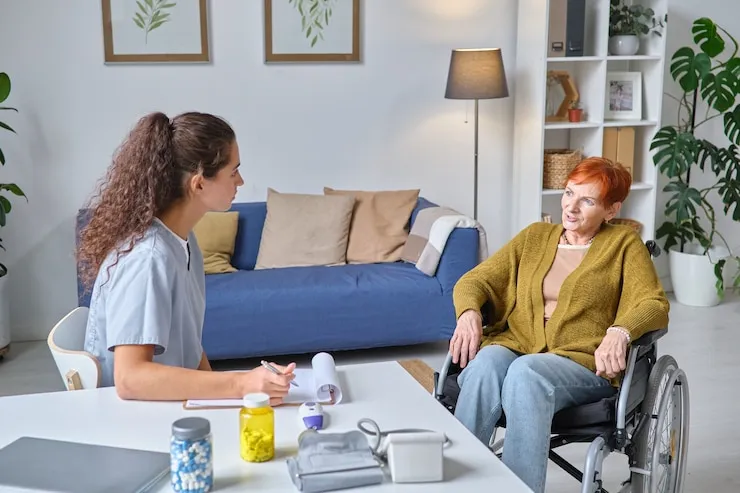
Speech therapy is often linked to children, but many adults also need professional help to improve their communication. Adult speech therapy can address speech, language, voice, fluency, and cognitive-communication challenges that affect daily life. Whether you are recovering from a stroke, living with a neurological condition, or simply want to refine your professional communication, speech therapy provides personalized strategies to build confidence and clarity.
This guide explains what adult speech therapy is, who can benefit, the different techniques used, and how to find the right speech therapist for your needs.
What Is Adult Speech Therapy?
Adult speech therapy is a type of rehabilitation and skill-building program that focuses on helping adults improve their speech, language, and communication abilities. Unlike children, adults often require therapy after a medical event or due to gradual changes in communication skills.
Key Areas Adult Speech Therapy Covers
Speech clarity (articulation therapy) – Improving pronunciation and reducing mumbling.
Language skills – Understanding and using words and sentences more effectively.
Voice therapy – Reducing hoarseness, vocal fatigue, or improving pitch and resonance.
Fluency therapy – Managing stuttering or speech blocks.
Cognitive-communication – Strengthening memory, attention, and problem-solving.
Swallowing therapy (dysphagia) – Helping with safe eating and drinking when swallowing is affected.
Who Needs Adult Speech Therapy?
Many people assume speech therapy is only for children, but adults can face communication challenges for many reasons.
Common Reasons Adults Seek Speech Therapy
Stroke recovery (aphasia or dysarthria).
Traumatic brain injury.
Neurological conditions (Parkinson’s disease, ALS, multiple sclerosis).
Voice strain (teachers, singers, speakers, or professionals who use their voice often).
Accent modification for clearer communication in English.
Stuttering that continues into adulthood.
Public speaking challenges and communication confidence issues.
For stroke recovery patients, see our detailed post on Adult Aphasia Communication Rehab.
Benefits of Adult Speech Therapy
The results of speech therapy can be life-changing.
Clearer communication in personal and professional life.
Improved confidence during presentations, interviews, or social events.
Better swallowing safety, reducing risks of aspiration.
Increased independence after medical conditions.
Enhanced cognitive skills like memory and focus.
Healthier voice use with reduced strain.
Different Types of Adult Speech Therapy
1. Articulation Therapy for Adults
Helps improve how speech sounds are produced. This is especially useful for individuals with unclear speech or those who want to polish pronunciation.
2. Voice Therapy
Supports adults with hoarseness, vocal fatigue, or voice disorders. Voice therapy is also beneficial for singers, actors, and professionals.
3. Aphasia Therapy
Designed for stroke survivors and those with brain injuries. It helps rebuild language skills such as speaking, reading, writing, and comprehension.
4. Fluency Therapy
Helps adults manage stuttering and gain tools to speak with greater ease and less anxiety.
5. Cognitive-Communication Therapy
Focuses on memory, attention, problem-solving, and organization, especially after brain injury.
6. Accent Modification
Not a medical disorder, but many adults seek therapy to reduce accents or improve clarity in English. Learn more in our post about Accent Modification Coaching for Adults.
What to Expect in Adult Speech Therapy Sessions
Initial Evaluation
The therapist will assess speech, language, and cognitive skills. They may also examine voice quality and swallowing abilities.
Customized Treatment Plan
No two adults have the same needs. Therapy plans are highly personalized with goals that fit medical, social, or professional situations.
Therapy Techniques Used
Modeling and repetition for speech sounds.
Breathing and vocal exercises for voice therapy.
Conversation practice to improve fluency.
Memory and problem-solving games for cognitive support.
Visual aids, apps, and technology to reinforce skills.
Frequency and Duration
Sessions are usually 1–2 times per week. Recovery and progress depend on the condition, motivation, and practice outside of therapy.
Online Speech Therapy for Adults
In today’s digital world, telepractice makes speech therapy accessible from anywhere.
Benefits of Online Adult Speech Therapy
Convenient for busy schedules.
No need for travel.
Access to top specialists nationwide.
Great for follow-up sessions and long-term support.
Many platforms, including the American Speech-Language-Hearing Association (ASHA). Find a Professional Directory, can help you locate both in-person and online therapists.
Tips for Success in Adult Speech Therapy
Practice daily – progress happens with consistent effort.
Set realistic goals – improvement takes time.
Use apps and tools recommended by your therapist.
Stay patient and motivated – small wins add up.
Include family and friends in communication practice.
Adult Speech Therapy Costs and Insurance
The cost of speech therapy varies based on location, therapist experience, and type of therapy.
Average cost: $100–$250 per session.
Insurance coverage: Many plans cover therapy after stroke, brain injury, or medical diagnosis. Accent modification or professional communication coaching is usually not covered.
Free or low-cost options: University clinics, nonprofit organizations, and hospital rehab programs.
FAQs About Adult Speech Therapy
1. How long does adult speech therapy take?
It depends on the individual’s condition. Some may see progress in weeks, while others need months or years of ongoing therapy.
2. Can adults improve speech after a stroke?
Yes. With consistent therapy, many adults regain speech and communication skills. Early treatment often leads to better results.
3. Is online speech therapy as effective as in-person therapy?
Yes. Studies show that telepractice is just as effective for many adults, especially for fluency, articulation, and language training.
4. Is accent modification part of speech therapy?
Yes, many speech-language pathologists offer accent reduction coaching for adults who want clearer English communication.
5. How do I find a certified speech therapist?
You can search the ASHA directory or ask your healthcare provider for referrals.
Final Thoughts: Take the First Step Toward Better Communication
Adult speech therapy is not just about improving pronunciation—it’s about rebuilding confidence, independence, and quality of life. Whether you are recovering from a medical condition or aiming to refine your professional skills, speech therapy offers the guidance and tools you need.
Don’t wait to start improving your communication. Connect with a certified speech-language pathologist today and take the first step toward clearer, more confident speech.


